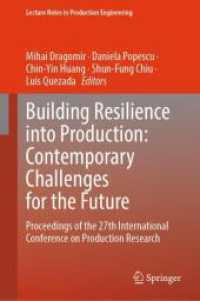- ホーム
- > 洋書
- > ドイツ書
- > Social Sciences, Jurisprudence & Economy
- > Politics, Society, Work
- > social science
基本説明
Examining the social aims underlying ICT integration in education.
Full Description
This book brings together the reflections of independent researchers from around the world. Sixteen authors from fourteen countries present their views on the use of information and communication technology (ICT) in education, offering valuable insights through the examination of current issues relevant to the future of education. What will education be in tomorrow's world? How can ICT be used without rendering education a purely technical process? How can we succeed the renovation of educational subjects without transforming them into technical objects? The introductory chapter of this publication guides us into the essays through a classification organized by the editors to illustrate different attitudes to technologies: • The 'Globalizers' see the integration of ICT and education as a means of enhancing the competitiveness of their society in a global economy; • The 'Reformists' see it as a means of bringing about significant change in didactics in the various disciplines, and even in the 'basics' of education; • The 'Humanists' consider technologies as possible catalysts for changing the aims and values of education from learni- oriented to humanistic; • The 'Heretic' sees values and aims as being determined exclusively by technology, and economy and culture as s- products of the technology-guided process. He therefore does not see any sense in interrogations as to which aims should guide us in integrating technology with education. Obviously, some arguments stretch across all four categories without completely matching any so-called type.
Contents
The Globalizers.- ICT-in-Education Policies and Implementation in Singapore and Other Asian Countries.- Confronting the Challenge of the Information and Knowledge Society in Developing Countries.- The Reformists.- The Turtle Stands on an Emerging Educational Paradigm.- Portable Computing Challenges Schooling.- Thus Spake Venitia.- Professional Development for Teachers and Quality in School Education.- Literacy, or the Art of Integration.- The Humanists.- Recreation.- What Kind of Technologies for What Kind of Education?.- Policy, Practice and the' space' in Between.- Why Should Children go to School?.- Digital Inclusion in Brazil.- Towards a New Canon in Education.- The Heretic.- Visions, Values, Technologies and Schools.







